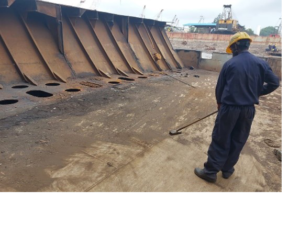- Leading ship recycling company and has been established in 1983
Setting Sail for Sustainability: How Training Shapes Eco-Friendly Ship Recycling
The ship recycling industry is transforming to adopt more sustainable and eco-friendly practices. To make ship dismantling more sustainable at the global scale it is important to consider the social and economic impacts of ship recycling while ensuring that environmental impacts and worker health are appropriately managed. At R.L. Kalthia, we have compiled a blog post on “Setting Sail for Sustainability: How Training Shapes Eco-Friendly Ship Recycling.” In this blog, we dig deeper into how ship recycling has transformed over the years and the role of training in propagating eco-friendly ship recycling.

Crucial Role of Training in Eco-Friendly Ship Recycling Practices
Working on end-of-life vessels requires proper training for the proper management of hazardous materials and to ensure the worker’s safety and welfare. The training for eco-friendly ship recycling practices is governed by STCW (Standards of Training, Certification, and Watchkeeping Rules). These rules are amended at regular intervals to ensure that the crew or workforce on the ship is well-trained to work safely onboard a vessel.
Training plays a crucial role in ensuring that eco-friendly ship recycling practices are implemented throughout the ship dismantling process and the workforce is well-prepared in the face of any accident. To successfully implement sustainable shipbreaking practices, it is important to ensure that proper training is given to make the workforce well-informed, skilled, and committed to adopting practices that minimize the environmental impact of ship dismantling. The key points that emphasize the role of training in propagating eco-friendly ship recycling practices are mentioned as follows:
- Training helps shipyard workers stay informed and updated about the regulations and latest advancements in the ship recycling industry.
- Ensure that workers are aware of potential dangers and are fully equipped to protect themselves and their coworkers.
- Encourage industry professionals to adopt advanced cutting techniques, containment systems, and recycling technologies.
Different Training Programs for Shipyard Workers
The Directorate General of Shipping has been appointed as an apex body for overseeing the ship recycling activities in India. Gujarat Maritime Board is a regional body that looks over the ship recycling activities at Alang. The Gujarat Maritime Board (GMB) has prepared three different training programs for yard workers to ensure that they are fully prepared to manage the ship dismantling process. Let’s take a look at these three different training programs with the table given below.
|
Training Program |
Learnings |
| Comprehensive Safety Training | – Identification of hazards in gas-cutting operations
– Application of Personal Protective Equipment – Highlights the hazards of working in a confined space, working at height, working in the engine room, and the presence of a hazardous atmosphere |
| Refresher Safety Training | – Revision of comprehensive training
– New developments in the ship recycling industry – Accident case studies to shed light on the root causes of various accidents and their preventive measures. |
| Gas Cutter Safety Training | – Specialized training for workers who would be working as gas cutters.
– Made aware of fire prevention and protection during the gas-cutting operations. |
Upon clearing the training programs and verbal/written exams the certificates are issued to the workers as proof of training and skills they learned during that time. These training sessions are conducted free of cost to give priority to the worker’s safety and welfare. In case a worker fails to clear the tests, he/she is required to undergo the training once again.
Benefits of Training for Eco-Friendly Ship Recycling
To make sustainable ship recycling a living reality it is important to have a workforce well-versed in ship recycling and different activities present in the whole process. Therefore, it is important to make training mandatory for the workers to advocate sustainable approaches that contribute to the overall success of the shipbreaking industry. Training workers in eco-friendly and sustainable ship recycling practices can completely transform shipbreaking activities and offer numerous benefits to the environment and the industry.
The list of benefits offered by making training an integral part of ship recycling is briefed below:
- Prevent the release of hazardous substances, thereby contributing to environmental preservation.
- Helps reduce accidents and injuries and improve overall workplace safety for the shipyard workers.
- Empower workers to adopt advanced techniques and the latest tools.
- Better equipped to handle various types of waste and implement proper waste management practices.
Conclusion
Training is a crucial aspect of promoting Eco-Friendly Ship Recycling practices and making it an integral part of shipbreaking. The investment in training shall be encouraged by the government and made a compulsion to ensure the safety and well-being of workers while preparing them for any mishap or accident in the future. It also contributes to global efforts to promote responsible and sustainable business practices.